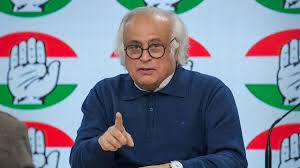NEW DELHI: The Congress on Sunday said Modi government’s “retrograde policies” have eroded investor confidence and transformed the ease of doing business into an “unease of doing business”.
Ahead of the Union Budget, the Opposition party called for urgent measures to eliminate “raid raj” and “tax terrorism”. It asked the government to protect Indian manufacturing jobs and implement policies to boost wages and purchasing power of people.
Congress general secretary in charge of communications Jairam Ramesh accused the government of failing to deliver on its promise to improve the ease of doing business. Instead, he claimed, private investment has dropped to record lows, and numerous businesspersons have migrated abroad.
“A Byzantine, punitive and arbitrary tax regime covering both GST and income tax amounting to sheer tax terrorism is now the greatest threat to India’s prosperity and has contributed to an ‘unease of doing business’,” Ramesh said in a statement.
He highlighted that private domestic investment, which accounted for 25-30 per cent of the GDP during Manmohan Singh’s tenure, has dropped to 20-25 per cent under the Modi government.
“This sluggish investment has coincided with a mass exodus of high-net-worth individuals. Over 17.5 lakh Indians have acquired citizenship in other countries in the past decade,” Ramesh claimed.
Ramesh attributed the current economic challenges to three factors: Complicated GST structure, unabated Chinese imports and weak consumption and stagnant wages.
Ramesh criticised the GST regime, which he said includes over 100 different tax rates, making it overly complex. GST evasion has reportedly soared to Rs 2.01 lakh crore in FY24, nearly double the Rs 1.01 lakh crore in FY23.
Ramesh alleged that Chinese imports have continued to surge, resulting in a record trade deficit of $85 billion in 2023-24. He argued that this has hurt Indian manufacturing, particularly in labour-intensive sectors.
Ramesh said stagnant wages and weak consumption growth were major concerns. Real wages for agricultural labour grew by 6.8 per cent annually under the UPA but declined by 1.3 per cent annually under the Modi government, he said.
He further cited the Periodic Labour Force Survey, which found average real earnings stagnated across all types of workers between 2017 and 2022.


